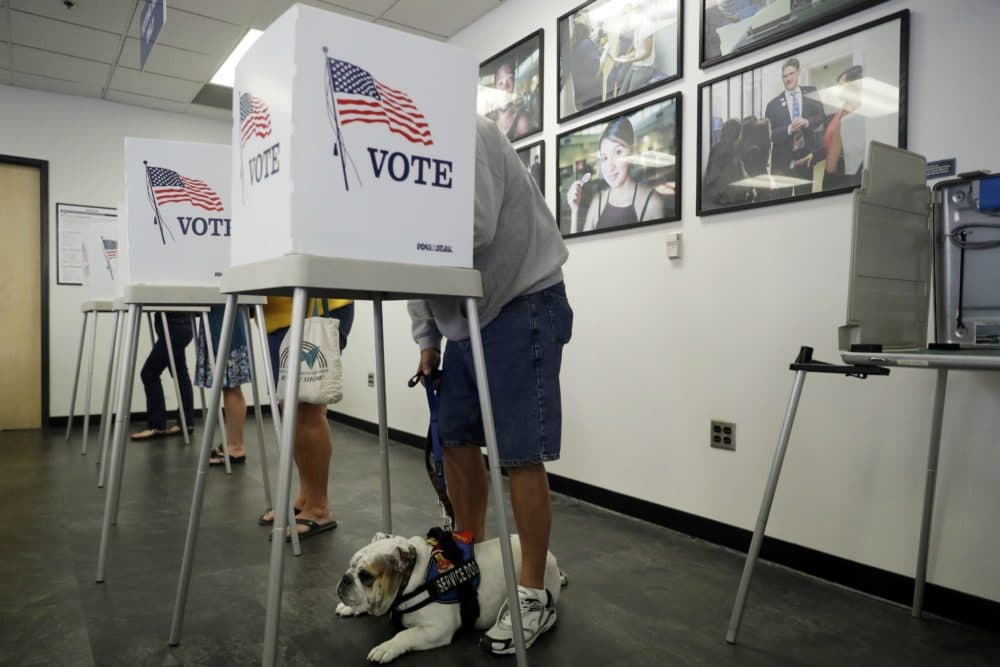Advertisement
'Electability': For The 2020 Presidential Candidates, What Does It Really Mean?

If you're voting in the 2020 Democratic primaries, what are you looking for in a candidate?
You've got — already — over 20 people to consider, which is a lot to comb through.
The options? A professor. A prosecutor. Several longtime legislators. An openly gay millennial. People of color. Women of color.
But, poll after poll shows that you and the others voting in your party say that identity and policy aren't what matters most. "Electability" is.
What does that mean?
"There's been a few polls where if you ask people, 'Do you want someone who agrees most with your political ideology and views? Or, do you want someone who is most likely to beat Donald Trump?' you find Democrats are saying the second thing, most likely to beat Donald Trump, over the first one, which is about ideology," Perry Bacon Jr., senior political writer for FiveThirtyEight, told On Point's Meghna Chakrabarti.
"It is a very complicated concept, but 93% of Democratic voters despise Donald Trump, and electability is by far the biggest criteria right now," Democratic pollster Celinda Lake added.
So, that's one piece of it — how will this candidate stack up against President Trump? But, it's not the whole story.
"I think a lot of voters would probably say the Democrats generally have fairly similar views. So assuming that I can vote for a pro-Obamacare person who's going to work on climate change, someone who's for criminal justice reform — I want the most electable version of that person," Bacon Jr. said.
What makes a candidate "the most electable" if public perception is that the field is relatively similar on policy stances? For the context of 2020, there's more nestled within the qualification of just, "Who can beat President Trump?"
Bacon Jr. said it can be a problematic concept. In the past, for instance, it's played into racism or sexism. He pointed to the Democratic primary for Georgia's gubernatorial election in 2018, where Stacey Abrams, a black woman, beat out Stacey Evans, a white woman.
"Evans supporters would kind of imply at times, 'Evans is more electable,' and I think everybody saw or thought the code there was basically that Abrams is a black woman in the South and therefore she can't win the general election," Bacon Jr. explained.
"We have, depending on the poll, anywhere from 38 to 52 percent of the voters who say 'electability is my number one criteria,' but they don't necessarily think the person they like the best is the person who is most electable."
Celinda Lake
And, what we mean by "electability" has evolved over time, Lake added.
"This time around it means beat Donald Trump," she said. "This time more voters are giving it weight than have ever done before. We have, depending on the poll, anywhere from 38 to 52 percent of the voters who say 'electability is my number one criteria,' but they don't necessarily think the person they like the best is the person who is most electable.
"We asked voters, actually, what do you mean by electability and they said two things. They said experience and strength. But I think that Perry is right, and I think that your callers have been right as well that there's a lot of code there, and we should be deeply suspicious of what people mean by experience, strength and electability."
Bacon Jr. also said, at the level of the general election for the president of the United States, we don't have much evidence for how women candidates perform, arguing that you can't determine whether or not a woman is "electable" solely on the basis of Hillary Clinton's performance in the 2016 general election.
On Point caller Eric, from Largo, Florida, had something to add.
"I just want to make a point that Hillary Clinton won the popular vote by over 3 million votes in 2016 and lost the electoral college because she didn't campaign in key states where she just decided that it wasn't worth it to go," he said. "Trump's election is more or less a mistake because she didn't do what she was supposed to do and go to those states. ... And so the question of whether a woman can win has already been answered."
What Are They Saying? More From On Point Listeners And Guests
Here's what else On Point listeners and guests contributed to our conversation.
Stina, from Waterford, Michigan: "I think that voters in general want someone who's passionate, who is unapologetic about their beliefs, who's firm consistent, happily articulate, not angry and who represents the values that in poll after poll, on issue after issue reflect, what most Americans really want — despite who's in the White House right now — which has to do with, gun control and climate change and a whole host of other things, affirmative action, etc. It may be that the persons running who best represent those criteria are white men. That's not their fault.
"Of the candidates out there, people seem to want to narrow it down — and I can understand why — to what they're calling the B's right: Beto, Buttigieg, Biden. And all of them happen to be white males. I wouldn't hold that against them. I'm not certain that the country is, frankly, ready for a woman. I want them to be, but I'm not certain that they are."
Matt, from New Orleans, Louisiana: "It's funny. I was just watching an episode of 'The West Wing' last night where the subject was the electability of Matt Santos in that fictional world. And there was a lot of discussion of the presidential voice — does he have the presidential voice and what does that mean? And it really made me wonder, are there conflicts between what we tell ourselves that we want, what we prefer consciously, and what our subconscious is kind of preprogrammed to be looking for in an electable candidate?
"I think that there could be some conflict there, frankly, and it was it was really interesting to watch you know in that show. Again, it's a fictional show that was based so much on what had happened in the Clinton years and what was happening in the present time, in the Bush years. But Matt Santos was the diverse candidate. He was a Hispanic congressman from Texas in a field of all white males, and so it was interesting to see how 13 or 14 years ago that was grappled with, versus today. But I'm looking for somebody who is going to be willing to be courageous and step out and have a voice that might not be so popular, even on the left. And I think somebody who represents that to me is Sen. Cory Booker. I think that he calls us to our better angels."
Fran, from Vermont: "What I am looking for is not just the presidential candidate, but the running mate. I want to see representation and balance in the Democratic ticket."
Brian Hardzinski produced this hour for broadcast.
